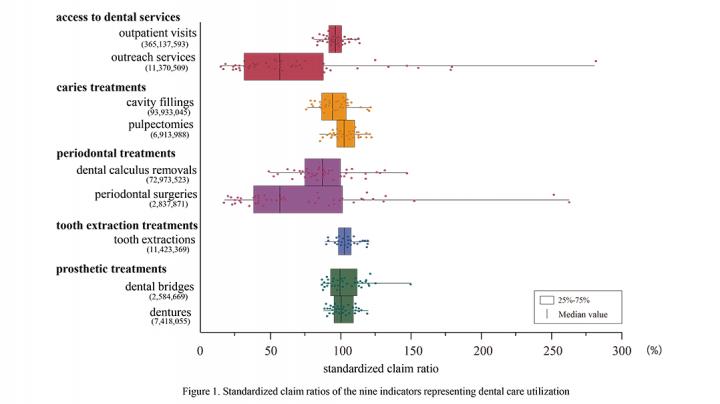University of Tsukuba study finds urgent and substantial dental care have small regional inequalities in Japan, while periodontal care and outreach services are largest; income, education levels also may negatively affect dental care utilization
Tsukuba, Japan – Inequitable access to health care is a pressing global health concern, and care of our teeth is no exception. In fact, the World Health Organization established the Global Goals for Oral Health 2020 in its efforts to help counter socioeconomic-related imbalances. Economically advanced Japan has plentiful dentists, as well as a universal health insurance system, yet it also has oral care-related inequities, according to a new study.
A team of researchers centered at University of Tsukuba in Japan examined a huge set of claims and checkup data in search of regional and socioeconomic trends. Their findings included the key observation that regional lower income and educational levels may correlate with failing to seek preventive dental treatment. The study was reported in The Lancet Regional Health – Western Pacific.
“We conducted an ecological [population-level] study to try and grasp how people access oral care across Japan, and what they seek,” former Associate Professor Takahiro Mori, a study co-author, says. “This was the first-ever national-level attempt to examine regional inequality in dental care use in our country.”
The 216 million pieces of data in this study spanned April 2017 to March 2018 and included indicators such as outpatient visits, use of outreach (home) services, and treatments such as fillings and dentures. The data were also examined in different regions in relation to socioeconomic factors such as income and education. This is the first time that such findings were possible, as previous studies had been of a much smaller scale.
The basis for the researchers’ calculations was what’s called a standardized claim ratio (SCR). This is a numeric index representing the observed vs. expected claims. An SCR of 100 for a region (in this case a Japanese prefecture) indicates the same level as for the entire country. The low SCR of 1.4 for outpatient visits meant access was relatively balanced. The 19.3 and 17.6 for outreach services and periodontal surgeries, however, showed wide regional inequalities.
Perhaps the most important finding regarded income and education.
“Access to preventive care was negatively correlated with areas that showed lower income and education levels. This means people in those areas may be less likely to seek preventive dental measures such as calculus removal (i.e., cleaning),” Professor Nanako Tamiya, the study’s senior author, says. “This, in turn, can make it harder to preserve teeth, and necessitates more severe treatment.”
The authors stress this ecological study shows the big picture, not necessarily the individual one. Conversely, however, they note this is the first nationwide study in Japan to show regional inequalities. “Knowing these inequalities is a key first step in righting them,” Professor Tamiya says.
###
The article, “Regional Inequality in Dental Care Utilization in Japan: An Ecological Study Using the National Database of Health Insurance Claims,” was published in
The Lancet Regional Health – Western Pacific at https:/
Media Contact
Naoko Yamashina
[email protected]
Related Journal Article
http://dx.





